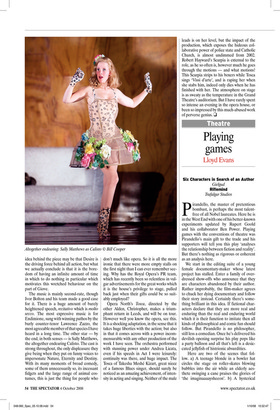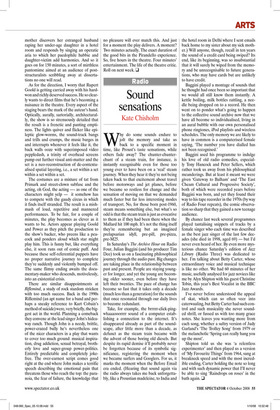Playing games
Lloyd Evans
six Characters in search of an Author Gielgud Riflemind Trafalgar Studios
Pirandello, the master of pretentious bombast, is perhaps the most talentfree of all Nobel laureates. Here he is in the West End with one of his better-known experiments updated by Rupert Goold and his collaborator Ben Power. Playing games with the conventions of theatre was Pirandello’s main gift to the trade and his supporters will tell you this play ‘analyses the relationship between fiction and reality’. But there’s nothing as rigorous or coherent as an analysis here.
We start in the editing suite of a young female documentary-maker whose latest project has stalled. Enter a family of overdressed show-offs who announce that they are characters abandoned by their author. Rather improbably, the film-maker agrees to chuck her dying documentary and follow their story instead. Certainly there’s something brilliant in this idea. If fictional characters declare that they are more real and enduring than the real and enduring world which it is their function to imitate then all kinds of philosophical and comic fun should follow. But Pirandello is no philosopher, still less a comedian. Once he’s delivered his devilish opening surprise his play pops like a party balloon and all that’s left is a desiccated jellyfish of histrionic absurdities.
Here are two of the scenes that follow. a) A teenage blonde in a bowler hat circles the stage on roller-skates blowing bubbles into the air while an elderly aesthete swinging a cane praises the glories of ‘the imaginaaaaysheeon’. b) A hysterical mother discovers her estranged husband raping her under-age daughter in a hotel room and responds by singing an operatic aria to which her paedophile hubbie and daughter-victim add harmonies. And so it goes on for 150 minutes, a sort of mirthless pantomime aimed at an audience of poststructuralists scribbling away at dissertations no one will read.
As for the direction, I worry that Rupert Goold is getting carried away with his hardwon and richly deserved success. He so clearly wants to direct films that he’s becoming a nuisance in the theatre. Every aspect of the staging bears the mark of the auteur’s hand. Optically, aurally, sartorially, architecturally, the show is so strenuously detailed that the result is a frenetic and panting emptiness. The lights quiver and flicker like epileptic glow-worms, the sound-track bangs and trills and crumps, the music barges in and interrupts whenever it feels like it, the back walls ooze with superimposed video peppledash, a trinity of overhead screens pump out further visual anti-matter and the set is a neo-reconstruction of de-contextualised spatial layering, i.e., a set within a set within a set within a set.
The costumes are a mixture of tat from Primark and street-clown subfusc and the acting, oh God, the acting —as one of the characters might yelp — it somehow has to compete with the gaudy circus in which it finds itself stranded. The result is a mishmash of loud, repetitive and mannered performances. To be fair, for a couple of minutes, the play becomes as clever as it wants to be. Actors appear playing Goold and Power as they pitch the production to the show’s backer, who preens like a peacock and ponders aloud which star might play him. This is funny but, like everything else, it soon runs out of comic puff. And because these self-referential puppets have no proper narrative journey to complete they’re suddenly and violently bumped off. The same flimsy ending awaits the documentary-maker who descends, motivelessly, into an existential crisis.
There are similar disappointments at Riflemind, a study of rock stardom stricken with too much success. Back in the 1990s Riflemind (an apt name for a band and perhaps a sneaky reference to Kurt Cobain’s method of suicide) were, very briefly, the biggest act in the world. Planning a comeback they convene at the lead singer John’s hideaway ranch. Though John is a needy, brittle, power-crazed bully he’s nevertheless one of the nicer characters in a play that wants to cover too much ground: musical inspiration, drug addiction, sexual betrayal, brotherly love and super-group power-politics. Entirely predictable and completely jokefree. The over-earnest script comes good right at the end where John makes a terrific speech describing the emotional pain that threatens those who reach the top: the paranoia, the fear of failure, the knowledge that no pleasure will ever match this. And just for a moment the play delivers. A moment? Two minutes actually. The exact duration of the good bits in the Pirandello experience. So, five hours in the theatre. Four minutes’ entertainment. The life of the theatre critic. Roll on next week. ❑











































































 Previous page
Previous page